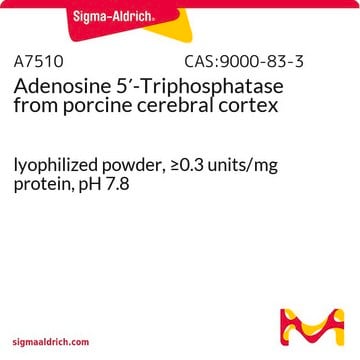A9062
Adenosine 5′-triphosphate di(tris) salt hydrate
≥95%
Synonym(s):
ATP, 5′-ATP-DiTris
About This Item
Recommended Products
biological source
(Fermentation)
Assay
≥95%
form
powder
solubility
H2O: 50 mg/mL
cation traces
Na: ≤0.1%
shipped in
dry ice
storage temp.
−20°C
SMILES string
O.NC(CO)(CO)CO.NC(CO)(CO)CO.Nc1ncnc2n(cnc12)[C@@H]3O[C@H](COP(O)(=O)OP(O)(=O)OP(O)(O)=O)[C@@H](O)[C@H]3O
InChI
1S/C10H16N5O13P3.2C4H11NO3.H2O/c11-8-5-9(13-2-12-8)15(3-14-5)10-7(17)6(16)4(26-10)1-25-30(21,22)28-31(23,24)27-29(18,19)20;2*5-4(1-6,2-7)3-8;/h2-4,6-7,10,16-17H,1H2,(H,21,22)(H,23,24)(H2,11,12,13)(H2,18,19,20);2*6-8H,1-3,5H2;1H2/t4-,6-,7-,10-;;;/m1.../s1
InChI key
ZMNHJZFDZFGOFE-MSQVLRTGSA-N
Looking for similar products? Visit Product Comparison Guide
Related Categories
Application
- to treat cells for Ca2+ influx measurements in stromal interaction molecule 1 knockout (STIM1−/−) mice and in vitro chemotaxis assay for microglial migration
- supplemented in buffer C for mitochondrial respiratory control assay and complex V activity assay
- in the inhibition of silver nano particles (AgNPs) on Na+/K+-ATPase activity
Biochem/physiol Actions
Adenosine 5′-triphosphate (ATP) is a central component of energy storage and metabolism in vivo. ATP is use in many cellular processes, respiration, biosynthetic reactions, motility, and cell division. ATP is a substrate of many kinases involved in cell signaling and of adenylate cyclase(s) that produce the second messenger cAMP. ATP provides the metabolic energy to drive metabolic pumps. ATP serves as a coenzyme in a wide array of enzymatic reactions.
Caution
Signal Word
Warning
Hazard Statements
Precautionary Statements
Hazard Classifications
Eye Irrit. 2 - Skin Irrit. 2 - STOT SE 3
Target Organs
Respiratory system
Storage Class Code
11 - Combustible Solids
WGK
WGK 3
Flash Point(F)
Not applicable
Flash Point(C)
Not applicable
Personal Protective Equipment
Certificates of Analysis (COA)
Search for Certificates of Analysis (COA) by entering the products Lot/Batch Number. Lot and Batch Numbers can be found on a product’s label following the words ‘Lot’ or ‘Batch’.
Already Own This Product?
Find documentation for the products that you have recently purchased in the Document Library.
Customers Also Viewed
Our team of scientists has experience in all areas of research including Life Science, Material Science, Chemical Synthesis, Chromatography, Analytical and many others.
Contact Technical Service













